Scholars have analyzed White Americans’ attitudes toward other racial and ethnic groups as well as what they think about their own group’s status. However, little is known about how Whites understand whiteness. Sociologist James M. Thomas will examine how White southerners’ who came of age during the major social, political, and economic events of the last three decades understand the American racial hierarchy and their place within it.
Racial discrimination by police is one of the most pressing domestic policy issues of our time. Most literature on officer behavior has focused on how characteristics such as race, gender, age, and experience impact officer decision making. However, less is known about the role peers and networks play in influencing officer behavior. Sociologist Gerard Torrats-Espinosa will conduct research across five U.S. cities to examine how diversity in the workplace, peer influences, and officer networks impact officers’ behavior when they come into contact with citizens.
During the COVID-19 pandemic, millions of people lost their jobs. At the same time, online microtask platforms – web-based labor platforms that allow businesses and individuals to outsource tasks to a workforce who can complete tasks virtually – seemed to thrive and the number of workers engaged in microtasks for online platforms like Amazon Mechanical Turk (MTurk) is growing. However, few researchers have focused on this type of gig work.
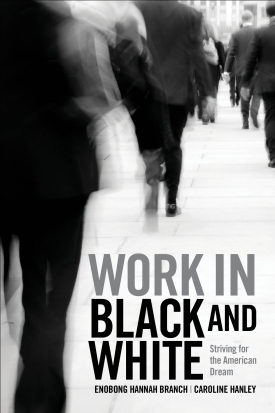
Work in Black and White
About This Book
“Enobong Hannah Branch and Caroline Hanley have written an insightful book that documents just how fragile the American Dream is and always has been for Black workers. Anyone who wants to understand the complex, nuanced relationship between race, gender, and economic insecurity needs to pick up Work in Black and White immediately.”
—ADIA WINGFIELD, vice dean of faculty development and diversity, professor of sociology, Mary Tileston Hemenway Professor of Arts and Sciences, Washington University in St. Louis
“Work in Black and White deftly weaves Black and White workers’ sense making of their labor market insecurities with clear historical and demographic analyses. ‘Stories have the power to make inequality legitimate,’ the authors write and go on to document the commonalities and divergence in stories told by educated men and women. While Black and White workers share aspirations for security, they part ways on how to understand the barriers to achieving it. Black workers recognize continuities in racism and White nepotism but also tend to believe they have some control over their own futures. Whites misperceive their precarity as a loss of racial privilege, while being blind to their advantaged reliance on White networks to get and keep jobs. Both groups embrace myths around hard work, education, and meritocracy and so are unable to imagine, much less generate, a political agenda to deal with the profound structural weaknesses of the U.S. economy. Read this book.”
— DONALD TOMASKOVIC-DEVEY, professor of sociology and director, Center for Employment Equity, University of Massachusetts, Amherst
“Work in Black and White reminds us that leaving school is just the beginning of the struggle for economic security. Many workers experience recessions as new threats and recoveries as challenges to their past accomplishments. And, of course, nothing works the same for women and men or Blacks and Whites. Enobong Hannah Branch and Caroline Hanley build a case for employment policy that goes beyond credentials and self-reliance; America needs to reset the imbalance between workers and employers.”
—MICHAEL HOUT, professor of sociology and director, Center for Advanced Social Science Research, New York University
The ability to achieve economic security through hard work is a central tenet of the American Dream, but significant shifts in today’s economy have fractured this connection. While economic insecurity has always been a reality for some Americans, Black Americans have historically long experienced worse economic outcomes than Whites. In Work in Black and White, sociologists Enobong Hannah Branch and Caroline Hanley draw on interviews with 79 middle-aged Black and White Americans to explore how their attitudes and perceptions of success are influenced by the stories American culture has told about the American Dream – and about who should have access to it and who should not.
Branch and Hanley find that Black and White workers draw on racially distinct histories to make sense of today’s rising economic insecurity. White Americans have grown increasingly pessimistic and feel that the American Dream is now out of reach, mourning the loss of a sense of economic security which they took for granted. But Black Americans tend to negotiate their present insecurity with more optimism, since they cannot mourn something they never had. All educated workers bemoaned the fact that their credentials no longer guarantee job security, but Black workers lamented the reality that even with an education, racial inequality continues to block access to good jobs for many.
The authors interject a provocative observation into the ongoing debate over opportunity, security, and the American Dream: Among policymakers and the public alike, Americans talk too much about education. The ways people navigate insecurity, inequality, and uncertainty rests on more than educational attainment. The authors call for a public policy that ensures dignity in working conditions and pay while accounting for the legacies of historical inequality.
Americans want the game of life to be fair. While the survey respondents expressed common ground on the ideal of meritocracy, opinions about to achieve economic security for all diverge along racial lines, with the recognition – or not – of differences in current and past access to opportunity in America.
Work in Black and White is a call to action for meaningful policies to make the premise of the American Dream a reality.
ENOBONG HANNAH BRANCH is Senior Vice President for Equity and Professor of Sociology, Rutgers University
CAROLINE HANLEY is Associate Professor of Sociology, William & Mary
RSF Journal
View Book Series
Sign Up For Our Mailing List
Apply For Funding
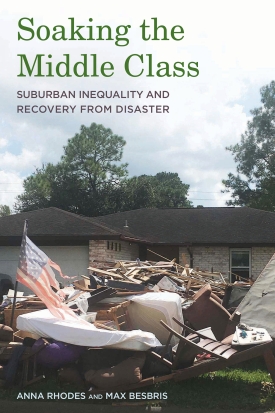
Soaking the Middle Class
About This Book
Extreme weather is increasing in scale and severity as global warming worsens. While poorer communities are typically most vulnerable to the negative effects of climate change, even well-resourced communities are increasingly vulnerable as climate-related storms intensify. Yet little is known about how middle-class communities are responding to these storms and the resulting damage. In Soaking the Middle Class, sociologists Anna Rhodes and Max Besbris examine how a middle-class community recovers from a climate-related disaster and how this process fosters inequality within these kinds of places.
In 2017, Hurricane Harvey dropped record-breaking rainfall in Southeast Texas resulting in more than $125 billion in direct damages. Rhodes and Besbris followed 59 flooded households in Friendswood, Texas, for two years after the storm to better understand the recovery process in a well-resourced, majority-White, middle-class suburban community. As such, Friendswood should have been highly resilient to storms like Harvey, yet Rhodes and Besbris find that the recovery process exacerbated often-invisible economic inequality between neighbors. Two years after Harvey, some households were in better financial positions than they were before the storm, while others still had incomplete repairs, were burdened with large new debts, and possessed few resources to draw on should another disaster occur.
Rhodes and Besbris find that recovery policies were significant drivers of inequality, with flood insurance playing a key role in the divergent recovery outcomes within Friendswood. Households with flood insurance prior to Harvey tended to have higher incomes than those that did not. These households received high insurance payouts, enabling them to replace belongings, hire contractors, and purchase supplies. Households without coverage could apply for FEMA assistance, which offered considerably lower payouts, and for government loans, which would put them into debt. Households without coverage found themselves exhausting their financial resources, including retirement savings, to cover repairs, which put them in even more financially precarious positions than they were before the flood.
The vast majority of Friendswood residents chose to repair and return to their homes after Hurricane Harvey. Even this devastating flood did not alter their plans for long-term residential stability, and the structure of recovery policies only further oriented homeowners towards returning to their homes. Prior to Harvey, many Friendswood households relied on flood damage from previous storms to judge their vulnerability and considered themselves at low risk. After Harvey, many found it difficult to assess their level of risk for future flooding. Without strong guidance from federal agencies or the local government on how to best evaluate risk, many residents ended up returning to potentially unsafe places.
As climate-related disasters become more severe, Soaking the Middle Class illustrates how inequality in the United States will continue to grow if recovery policies are not fundamentally changed.
ANNA RHODES is Assistant Professor of Sociology, Rice University
MAX BESBRIS is Assistant Professor of Sociology, University of Wisconsin-Madison
RSF Journal
View Book Series
Sign Up For Our Mailing List
Apply For Funding
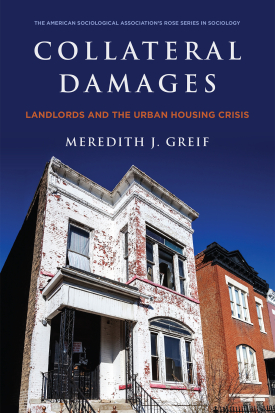
Collateral Damages
About This Book
“A riveting narrative of how decent people are transformed by conducive structural conditions into malevolent slumlords, Collateral Damages is guaranteed to make you think about the housing crisis in a new light. Meredith J. Greif lays bare how the very regulations meant to protect marginalized tenants stoke landlords’ illegal and immoral behaviors, ensuring even greater precarity in tenants’ lives. If you want to understand housing in America, this book is not to be missed.”
—KATHRYN EDIN, William Church Osborn Professor of Sociology and Public Affairs,Princeton University
“Collateral Damages provides a critical window into the understudied practices and motivations of small landlords, who collectively provide homes to most of the nation’s poor renters. Meredith J. Greif highlights the financial vulnerability of these housing providers and shows how structural forces can lead some of them to engage in harmful practices. Balanced and engaging, the book sends an important, cautionary note about how well-intentioned local laws can backfire and harm the very low-income renters they are meant to protect.”
—INGRID GOULD ELLEN, Paulette Goddard Professor of Urban Policy and Planning, New York University
Changes in federal housing policies over the past several decades shifted the primary responsibility for providing low-income renters with affordable housing from the government to private landlords. Federal, state, and local governments have passed laws to ensure that low-income renters are protected from illicit landlording practices. Yet we know little about how private landlords experience local housing regulations. In Collateral Damages, sociologist Meredith Greif examines how local laws affect private landlords and whether tenants are, in fact, being adequately protected.
For three years, Greif followed 60 private landlords serving low- and moderate-income residents in the Cleveland, Ohio, metropolitan area to better understand how local regulations, such as criminal activity nuisance ordinances (CANOs) and local water billing regulations, affect their landlording practices. CANOs are intended to protect communities by discouraging criminal activity on private properties. Property owners can face financial and criminal sanctions if they do not abate nuisance activities, which can include littering, noise, drug use, and calls for police assistance, including calls for domestic violence. Local water billing regulations hold landlords responsible for delinquent water bills, even in cases where the account is registered in the tenant’s name. Greif finds that such laws often increase landlords’ sense of “financial precarity” – the real or perceived uncertainty that their business is financially unsustainable – by holding them responsible for behavior they feel is out of their control. Feelings of financial uncertainty led some landlords to use illegitimate business practices against their tenants, including harassment, oversurveillance, poor property upkeep, and illegal evictions. And to avoid to financial penalities associated with CANOs and delinquent water bills, some landlords engage in discriminatory screening of vulnerable potential tenants who are unemployed or have histories of domestic violence or drug use. In this sense, by promoting a sense of financial insecurity among landlords, laws meant to protect renters ultimately had the opposite effect.
While some landlords, particularly those who rented a larger number of units, were able to operate their businesses both lawfully and profitably, the majority could not. Greif offers practical recommendations to address the concerns of small- and mid-sized landlords, such as regular meetings that bring landlords and local authorities together to engage in constructive dialogue about local housing policy, issues, and concerns. She also proposes policy recommendations to protect renters, such as establishing the right to counsel for lower-income tenants in eviction hearings and enacting a federal renter’s tax credit.
Collateral Damages is an enlightening investigation on how local laws and practices perpetuate disadvantage among marginalized populations and communities, in ways that are hidden and often unintended.
MEREDITH GREIF is assistant professor of sociology at Johns Hopkins University
RSF Journal
View Book Series
Sign Up For Our Mailing List
Apply For Funding
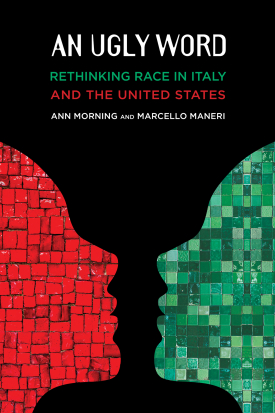
An Ugly Word
About This Book
We recently sat down with Ann Morning & Marcello Maneri to understand how everyday people view race in Italy and the United States. You can watch an abridged video of the interview above, or read or listen to the full transcript below.
Listen to Part 1 of 2 of the interview
Listen to Part 2 of 2 of the interview
Read a transcript of the full interview here.
Scholars and politicians often assume a significant gap between the ways that Americans and Europeans think about race. According to this template, in the U.S. race is associated with physical characteristics, while in Western Europe race has disappeared, and discrimination is based on insurmountable cultural differences. However, little research has addressed how average Americans and Europeans actually think and talk about race. In An Ugly Word, sociologists Ann Morning and Marcello Maneri examine American and Italian understandings of group difference in order to determine if and how they may differ.
Morning and Maneri interviewed over 150 people across the two countries about differences among what they refer to as “descent-based groups.” Using this concept allowed them to sidestep the language of “race” and “ethnicity,” which can be unnecessarily narrow, poorly defined, or even offensive to some. Drawing on these interviews, the authors find that while ways of speaking about group difference vary considerably across the Atlantic, underlying beliefs about it do not. The similarity in American and Italian understandings of difference was particularly evident when discussing sports. Both groups relied heavily on traditional stereotypes of Black physicality to explain Black athletes’ overrepresentation in sports like U.S. football and their underrepresentation in sports like swimming – contradicting the claims that a biological notion of race is a distinctly American phenomenon.
While American and Italian concepts of difference may overlap extensively, they are not identical. Interviews in Italy were more likely to reveal beliefs about groups’ innate, unchangeable temperaments, such as friendly Senegalese and dishonest Roma. And where physical difference was seen by Italians as superficial and unimportant, cultural difference was perceived as deeply meaningful and consequential. In contrast, U.S. interviewees saw cultural difference as supremely malleable—and often ascribed the same fluidity to racial identity, which they believed stemmed from culture as well as biology. In light of their findings, Morning and Maneri propose a new approach to understanding cross-cultural beliefs about descent-based difference that includes identifying the traits people believe differentiate groups, how they believe those traits are acquired, and whether they believe these traits can change.
An Ugly Word is an illuminating, cross-national examination of the ways in which people around the world make sense of race and difference.
ANN MORNING is professor of sociology at New York University
MARCELLO MANERI is associate professor of sociology at the University of Milan-Bicocca
RSF Journal
View Book Series
Sign Up For Our Mailing List
Apply For Funding
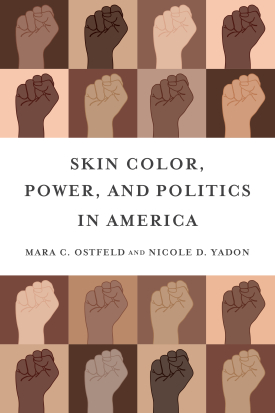
Skin Color, Power, and Politics in America
About This Book
"Skin Color, Power, and Politics in America offers a compelling study examining the linkage between skin color and politics in the United States. Importantly, Mara Ostfeld and Nicole Yadon embark on a careful comparative analysis that examines the nuances and varied effects of skin color on the political attitudes of the three major ethnoracial groups in the United States."
—MARISA ABRAJANO, professor of political science, University of California, San Diego
"The conception of race as a social construct is not novel. What is novel and what makes Skin Color, Power, and Politics in America an essential read is its nuanced and deeper understanding—from measurement to meaning—of the multifaceted ways that people are stratified by skin shade both across and within broadly defined racial groups, and how that sorting links to power and politics."
—DARRICK HAMILTON, university professor and Henry Cohen Professor of Economics and Urban Policy, The New School
"Skin Color, Power, and Politics in America is a landmark achievement. It provides new and important insights about how skin tone shapes politics within and across ethnoracial categories. By looking beyond broad ethnoracial categories using novel data, Mara Ostfeld and Nicole Yadon carefully reveal the manifold pathways through which race, gender, color, and class influence political ideologies and ethnoracial politics in the United States. In so doing, Skin Color, Power, and Politics in America is an indispensable resource and a must-read for anyone interested in enriching their understanding of contemporary ethnoracial politics in the United States."
—ELLIS MONK, associate professor of sociology, Harvard University
A person’s skin color affects their life experiences including income, educational attainment, health outcomes, exposure to discrimination, interactions with the criminal justice system and one’s sense of ethnoracial group belonging. But, do these disparate experiences affect the relationship between skin color and political views? In Skin Color, Power, and Politics in America, political scientists Mara Ostfeld and Nicole Yadon explore the relationship between skin color and political views in the U.S. among Latino, Black, and White Americans. They examine how skin color influences an individual’s politics and whether a person’s political views influence how they assess their own skin color.
Ostfeld and Yadon surveyed over 1,300 people about their political views, including party affiliation, their opinions on welfare, and the importance of speaking English in the U.S. The authors created a matrix grounded in their “Roots of Race” framework, which predicts the relationship between skin color and political attitudes for each ethnoracial group based on the blurriness of the group’s boundaries and historical levels of privilege. They draw upon three distinct measures of skin color to conceptualize the relationship between skin color and political views: “Machine-Rated Skin Color,” measured with a light-reflectance meter; “Self-Assessed Skin Color,” using the Yadon-Ostfeld Skin Color Scale; and “Skin Color Discrepancy,” the difference between one’s Machine-Rated and Self-Assessed Skin Color.
Ostfeld and Yadon examine patterns that emerge among these measures, and their relationships with life experiences and political stances. Among Latinos, a group with relatively blurry group boundaries and low levels of historical privilege, the authors find a robust relationship between political views and Self-Assessed Skin Color. Latinos who overestimate the lightness of their skin color are more likely to hold conservative views on current racialized political issues, such as policing. Latinos who overestimate the darkness of their skin color, on the other hand, are more likely to hold liberal political views. As America’s major political parties remain divided on issues of race, this suggests that for Latinos, self-reported skin color is used as a means of aligning oneself with valued political coalitions.
African Americans, another group with low levels of historical privilege but with more clearly defined group boundaries, demonstrated no significant relationship between skin color and political attitudes. Thus, the lived experiences associated with being African American appeared to supersede the differences in life experiences due to skin color.
Whites, a group with more historical privilege and increasingly blurry group boundaries, showed a clear relationship between machine-assessed skin color and attitudes on political issues. Those with darker Machine-Rated Skin Color are more likely to hold conservative views, suggesting that they are responding to the threat of losing their privilege in a multicultural society.
At a time when the U.S. is both more diverse and politically divided, Skin Color, Power, and Politics in America is a timely account of the ways in which skin color and politics are intertwined.
MARA OSTFELD is an assistant research scientist at the Gerald R. Ford School of Public Policy at the University of Michigan.
NICOLE YADON is an assistant professor of political science at The Ohio State University.
RSF Journal
View Book Series
Sign Up For Our Mailing List
Apply For Funding
Many studies document how social disasters generate a shock that unsettles political and cultural systems, generating opportunities for groups to mobilize for systemic change. Yet research also shows that social disasters amplify existing social inequalities, as in the pandemic’s disproportionate threat to Black and Brown youth, who found their life trajectories interrupted. Sociologist Hajar Yazdiha will examine how these competing perspectives might work in tandem by combining interviews with student activists and participant observation of two Los Angeles student activist organizations.
Sociologist Yolanda Wiggins will conduct a follow-up study to her previous research on intergenerational exchanges between college students and their families.
Pagination
- Previous page
- Page 15
- Next page
